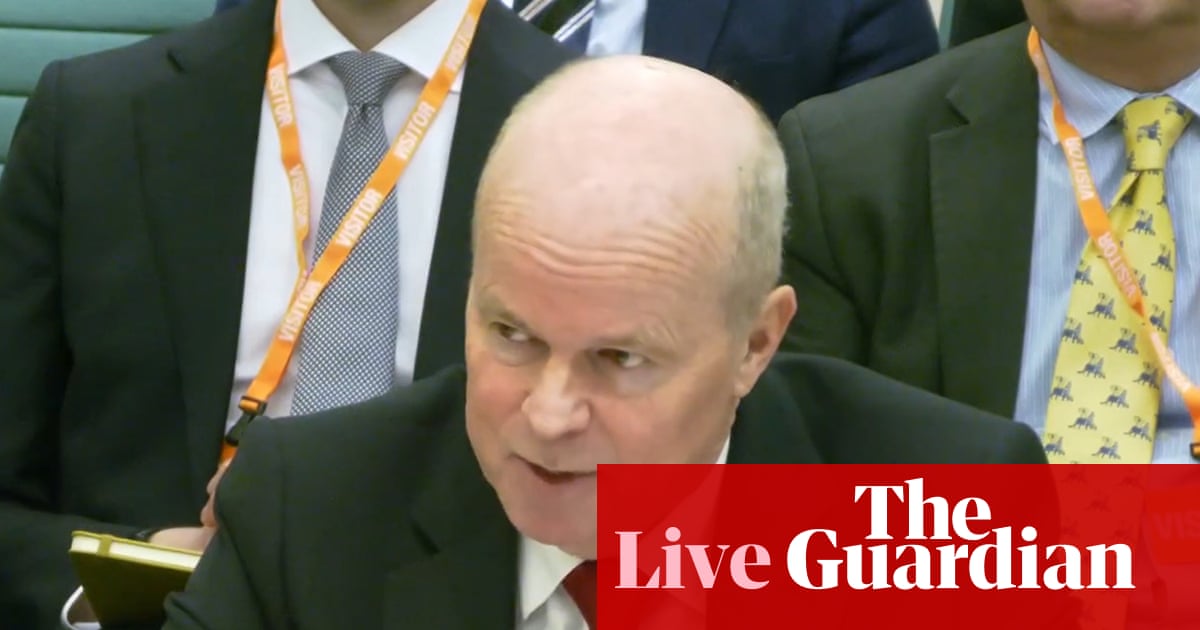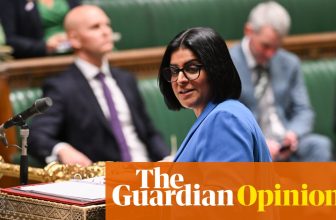
Gibb says ‘board coup’ description is ‘most ridiculous charge’
MP: Sir Robbie, there’s been a lot of speculation in the media, including BBC journalist, who saying that what’s happened to the BBC over the last couple of weeks was a board level orchestrated coup, if you like. Can you just address that for me now?
Gibb: “It’s up there as on the most ridiculous charges… it’s complete nonsense. It’s also deeply offensive to fellow board members who, as, Samir were saying, are people of great standing in different fields. The idea that somehow I had, I’m not even sure what the charges are, to be honest.
Thomson also says she certainly does nothing that “anything I saw in the last couple of weeks as being a coup for any kind of orchestrated board level”.
Key events
Shah also responds to the question about the broadcaster appealing to Reform UK voters.
He says the BBC news division must “reflect the point of view across the country”
“We do a lot of research on various demographics. We want to, for example, we need to make sure levels of trust are just as high among young people and this is normal business.
Referring to a geographical survey, he said: “One of the things about geography which I’m very exercised by is that support for the BBC declines as you go farther north. This is a very, very big issue for the BBC,” he said.
Gibb and Shah are asked about plans for the broadcaster to appeal Reform UK voters and whether there will be “something similar planned for Green voters”.
Gibb says there was concern about hostility towards the BBC from Reform UK voters, compared to Labour voters who, according to him, are largely supportive of the broadcaster.
Gibb says BBC exec are “massively alert”, adding: “This issue is something that’s very close to my heart, [the] issue about allocation of airtime to different political parties”
Shah has backed Gibb again, calling him “interested in impartiality and accuracy” after being asked whether he is “overly politically biased”.
Gibb says he has no intention of resigning
Gibb says he has no intention of resigning after being asked whether he would be stepping down.
“There’s been lots of stories that are just completely untrue about me in relation to influencing the day to day output,” he said.
“I don’t see I’ve done anything wrong. I’m a passionate defender of the BBC. I’m being a passionate defender of its values.”
Gibb is asked whether is was “sorry that Deborah [Turness] resigned”.
In response, he said: “I was disappointed that that we ended up in this, in the situation that she ended up resigning.”
Shah is asked whether there is “a problem with leaks in the BBC at the moment” after the internal dossier that sparked the recent troubles for the broadcaster was leaked to the Telegraph.
Shah says he has “initiated a leak inquiry”, adding: “We are a journalistic operation, and it doesn’t surprise me that we leak.”
Gibb says he has ‘impartiality through my bones’
Gibb said he has become “weaponised” before telling the committee that he is “hugely impartial”.
He said: “I think there couldn’t be a bigger mismatch between the way I’m presented in some quarters, in relation to my attitude.
“I think I’ve become weaponised in terms of how I’m perceived.
“Everyone who knows me knows that I’m hugely impartial. I have friends across the political divide.
“You know, I have impartiality through my bones.”
Gibb says ‘board coup’ description is ‘most ridiculous charge’
MP: Sir Robbie, there’s been a lot of speculation in the media, including BBC journalist, who saying that what’s happened to the BBC over the last couple of weeks was a board level orchestrated coup, if you like. Can you just address that for me now?
Gibb: “It’s up there as on the most ridiculous charges… it’s complete nonsense. It’s also deeply offensive to fellow board members who, as, Samir were saying, are people of great standing in different fields. The idea that somehow I had, I’m not even sure what the charges are, to be honest.
Thomson also says she certainly does nothing that “anything I saw in the last couple of weeks as being a coup for any kind of orchestrated board level”.
Shah steps in to defend Gibb
The BBC Chair has also spoken up amid this grilling of Gibb’s political connections.
“Every week I spoke to Robbie. He was the head of that [political] department. And not one week did he ever play any politics or anything.
“I think it is unfair to say that Robbie comes with he’s principally a journalist. He was a journalist running the whole BBC political journalism, and he did that with great skill and great, commitment to impartiality. That’s my view about it.”
MPs move questioning focus onto Sir Robbie Gibb
They are asking the former communications director for Theresa May and GB News co-founder about his “strong political convictions”.
He is asked how he manages his own biases given his role on a standards panel.
He says as a former BBC news producer for 25 years, who was also head of BBC Westminster, “I have a long track record. I primarily want to be defined as my commitment to the BBC not my two years working for Theresa May.”
He says he had impartiality drummed into him as a BBC reporter and that he has been mischaracterised in press reports. He says he was taught to leave politics at the door, and praised the BBC for instating a strong social media policy preventing its news journalists from showing their political leanings.
“I’m absolutely delighted to come here and give an opportunity to set out my case where hopefully I can demonstrate that the perception [on my political leanings] is actually wrong.”
Board member Thomson says she felt Panorama edit was misleading, while News argued it was ok
Another board member, Caroline Thomson, facing questions alongside Shah and Robbie Gibb, also steps in.
She says she and Shah and other board members felt the Panorama edit did constitute a breach of editorial guidelines, while the BBC News team did not.
“There was a continuing and sharp difference of opinion between, the chairman and me and others on the board, with the director of news about whether we were going to apologise just for the edit or whether the impact of the edit and indeed the position of the Proud Boys material had given a misleading impression. We felt that it had.
“And News [department] continued to maintain that actually the impression given despite the edit, was correct, because the gist of the speech by Trump had, for example, the use of the word ‘fight’ 15 times and only talked peace once. They felt that it was that the edit was justified, but it should have been a more transparent edit.
We felt that the edit had led to a more profound problem. And indeed, your quotation of the editorial guidelines is absolutely right. We felt it violated them.”
Shah is pressed again as to why there was such a “big delay” in the board replying to the editorial error in the Panorama edit.
An MP suggests it was due to “chaos on the board” and “division” among members as to how to respond.
Shah says it was not chaos, and that he replied to the committee within the deadline specified.
“I wanted to investigate what went wrong and get it right, and I needed to make sure the board were with me and we discussed this. I don’t think there was any chaos or difficulty there.”
MP: “As soon as the Telegraph started publishing this memo and and its coverage of it, there was just a vacuum in the BBC for nearly a week where there was no comment given in any meaningful way to the substance of it. Why didn’t you get on the front foot with either apology or some kind of defence of what would have happened?”
Shah: “Precisely for the question, you’ve just raised, I needed to understand what went wrong and to get the right answer. Getting the right answer was really important.”
The BBC Chair appears to be sticking to the answer he gave two weeks ago to the committee and also to his own staff; that he and the board took their time to come back with a response because they needed to check the story’s details. During that period, the director general and head of news resigned.
Second panel session begins with focus on the Chair
Lawmakers are now interviewing the BBC Chair Samir Shah, who has faced immense pressure and criticism from BBC staff that he has not stepped up to defend their journalism properly.
The first two questions out of the gate:
MP: Did you and the rest of the BBC board block the head of news [Deborah Turness] from apologising for the Panorama programme on the 10th of November?
Shah goes on to give a long answer detailing the timeline of what he and the board did when the Panorama complaint was raised. He does not appear to answer the question as to whether he blocked Turness from addressing the Panorama edit.
First panel session over
The first panel has concluded its questioning of the two external advisers to the standards committee. Michael Prescott was grilled over whether he himself showed bias in the editorial concerns he’d raised in his memo, the dossier which triggered the crisis.
Caroline Daniel repeatedly offered a robust defence of the BBC’s editorial inquiries, saying the organisation was rigorous in examining complaints and was constantly interrogating if a line had been crossed. She said it’s the most scrutinised news organisation in the UK and the constant self-examination was a sign of a “very healthy” organisation.
Response to misleading BBC Verify story didn’t go far enough, says Prescott
Prescott has been questioned again by lawmakers on whether his concerns all came from a certain bias.
He pivots away from the US election story and raises a complaint on a BBC Verify story which alleged that people from migrant backgrounds in the UK were being charged more from car insurance. The report didn’t take into proper account other market factors, Prescott said.
He says it’s a prime example of BBC News departments not responding properly when editorial concerns are raised, and what he seems to be alluding to is, a lack of questioning given the “cultural biases” he says are a problem in the newsroom.
“Of all the people across the BBC who heard that report, was there no professional scepticism? Jeez, we better have another look at that. This was multiple levels of failure and that’s why I put it in the memo.”
He says the response was “just not enough. This was a horrendous and embarrassing error one, by the way, that could have damaged community relations in this country.
“I mean, if you’re a black teenager sitting at home all day listening to that stuff, how would it make you feel?And it was all untrue.”
He says the BBC should have had “a full on inquest”.
Caroline Daniel says from her experience on the standards committee there was always active discussion on editorial bias.
“It’s put the spotlight on issues of impartiality, which in my view, the BBC was actively engaging with on a regular basis.
“The fact that the committee was extremely robust, discussions were had, research was commissioned on a regular basis, and it was challenging research, I think that’s a really healthy organisation and a very healthy debate.”







